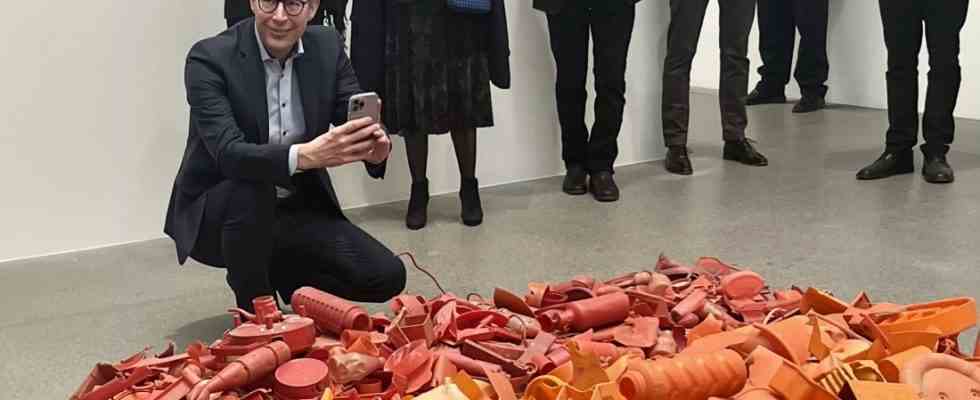Tony Cragg can call himself Sir, the Queen knighted him in 2002. He has received countless awards as a sculptor and the prices his work fetches from collectors are equally impressive. It is therefore perfectly understandable that Bavaria’s Minister of Art and Science should kneel at the elegant dinner hosted by the Friends of the Pinakothek der Moderne in honor of the artist.
He wants to get everything on his cell phone photo that makes up Cragg’s early work compiled from garbage, a kind of raft made of plastic objects arranged in rainbow colors. In his early days, Cragg created many such sculptures and stackable objects.
It later turns out that Markus Blume took more with him from this exhibition than a nice picture for his social media account. But first a few words about the wonderfully friendly, brimming with esprit Tony Cragg himself. Cragg, who as a Briton has lived in Wuppertal since 1977 and has also had German citizenship since Brexit, will give a speech in German. And, unlike many other artists, by no means taciturn.
Cragg takes his admirers on an art-philosophical lecture for life. “Our history of mankind is the history of form impoverishment,” says he, who taught for decades at the Düsseldorf Art Academy and was also its rector at times. “Walk through a city as beautiful and large as Munich for half an hour: you only see circles and right angles and gray upon grey. Walk through a forest for half an hour and you see all the splendour.”
Nevertheless, the world in its entirety is art. “And even who sits across from you at breakfast is an aesthetic choice,” Cragg says with a smile, and everyone at the banquet tables stares at each other for a moment. Art is “seeing the world through the eyes of another person”.
Markus Blume promptly proves that he is capable of doing this. He says he can now look at the many files that have piled up in his office, primarily on the many cultural buildings in Bavaria in need of renovation, in a completely different way. They are not just a burden. They are stacked works of art, in the spirit of Cragg. That Blume draws this comparison is a wonderful form of self-mockery. And the fact that the paper-free office has still not prevailed in Bavaria’s authorities is wonderful and nice.

